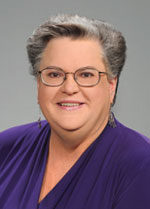By Susan E. Richardson
Author Profile—Terri Blackstock
In Sunday School I used to see the friend who had invited me to come with her, the one who made me welcome every Sunday, and assured me a “go to” place to sit. She had a kind word for everyone and made other visitors feel as welcome as I did. To look at her you’d never dream that she’d plotted several grisly murders or orchestrated a massive power outage.
Wonder how I felt safe sitting next to such a person? Easy enough, knowing the person was Terri Blackstock, one of the best Christian suspense novelists publishing today. Recently Terri and I had a chance to sit down together again and talk about her thirty years in publishing—from her beginning in general trade to her move to the Christian industry over twenty years ago.
Terri has told her story many times, about how God led her out of secular publishing and into the Christian market. Christian fiction was just starting to expand then, moving beyond prairie romance and spiritual warfare into a variety of different genres. Terri’s first Christian book, Evidence of Mercy, helped open the door for more suspense titles in the Christian market. Readers were ready for something new and her books sold well from the beginning.
Terri’s success brought her into an ongoing debate surrounding the question, “What makes fiction Christian? Wouldn’t all fiction written by a Christian be Christian fiction?” In response, Terri says, “I am a Christian fiction writer. Including a Christian message is part of my calling as a writer. I believe God gifted me to write stories, but they don’t end with just a good plot.” Some writers, though Christians personally, don’t feel called to include a Christian message in their work.
Some people still find the idea of Christian suspense hard to grasp. Maybe it’s similar to the contrast between Terri’s friendly personality, caring nature, and the stories she writes with murder and mayhem. Though her books include dark acts, those are not her focus. “By taking someone through the darkness, I can show the reader the light. Even if my character isn’t a Christian I can show what faith looks like through their decisions and interactions with other characters.” She uses darkness with care to point readers toward the light.
 She goes on to say, “I never want a reader to leave one of my books feeling defiled. The reader is always in the back of my mind, and I’m aware that each person has limits on how far they want to go with violence, especially. I want to create page turners that don’t offend.” That kind of approach requires Terri to maintain a constantly changing balance, as our society changes.
She goes on to say, “I never want a reader to leave one of my books feeling defiled. The reader is always in the back of my mind, and I’m aware that each person has limits on how far they want to go with violence, especially. I want to create page turners that don’t offend.” That kind of approach requires Terri to maintain a constantly changing balance, as our society changes.
“I want to challenge readers to re-think things in ways that deepen their faith, instead of pulling them away.” Fiction can certainly influence culture, and she doesn’t want her books to reinforce negativity. She strives for authenticity within the culture by staying up to date on technology, speech patterns, and media but remains firmly Christian in content and focus.
Being an author tosses you into other discussions about books. Some people claim that Christian fiction is agenda-driven, meaning books are more about faith than the usual literary criteria. Terri draws a firm line between agenda-driven fiction and fiction from a Christian worldview. Christian authors still may address a particular issue, but they must weave that message in with a well-developed plot and characters. A Christian worldview is wider than an agenda and should permeate the book.
So how does Terri write a book? Usually, she starts the same way any fiction writer would. She gets a story idea and begins creating a basic plot. Then she works on characters that fit with her story. Once she has plot and characters, she advances the two together. From the interaction of plot and character comes theme, which may include a specific issue, not just an overall message. Every rule has an exception, of course. Terri has written some books, like Predator and her Intervention Series, which address specific issues, such as drug abuse or the dangers of social networking, but most of her work begins with a story.
When it comes to the character portion of her books, she makes an important point. “If you leave out the spiritual element, whether the character is a Christian or not, you miss an important dimension of who they are.” In writing, you’re always looking for a character’s motivation. Whether or not the character is a Christian, his or her thoughts about the spiritual realm add to who they are.
In the end, Terri has the same goal for every book. When she left secular publishing for the Christian market, she made a vow to God. She promised Him, “I will never write another book that does not glorify You. That is still foremost in every book I write.”
Her vow that her work will glorify God leads her to keep firm control of her books’ content. People ask when there might be a movie based on one of her books. Secular production companies prefer the action and suspense portion to the Christian worldview. “In one case I had a company option one of my books,” she said. “When they sent me the script, I hated it! They’d taken out what I considered important and added things I didn’t want associated with my name. I refused to renew the option because I didn’t think we were on the same page.”
Perhaps the most interesting question Terri gets is, “When are you going to write a real book?” Usually, the questioner means non-fiction, as though fiction is a waste of time. Some people think Christians should only be reading books on spiritual development, but Terri gets lots of letters from readers whose lives changed after reading one of her books. “Fiction can be extremely powerful,” she said. “That’s why Jesus taught in parables. He knew that when you stepped into a character’s skin you never forgot how they felt.”
Terri’s now written forty-eight books in the Christian market. If I’m Found, book two of her If I Run Series, released at the end of March. You’ll find a review in the “Rave Reviews” section of this magazine. If you’ve never tried Terri’s work, now is a good time to start. Then you, too, can wonder how such a nice person can think up such dastardly plots.

Susan E. Richardson is a writer, critique reader, and former Christian retailer with a passion for meeting people’s needs through the written word.